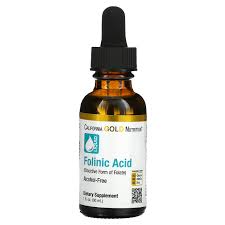
Introduction
Folinic acid, also known as leucovorin, is a form of folate or vitamin B9 that plays a crucial role in various physiological processes in the human body. Its importance has risen significantly in recent years, especially in discussions surrounding cancer treatment, folic acid deficiency, and certain medical therapies. Understanding folinic acid is vital for healthcare professionals and patients alike, as it holds several benefits and applications across different medical fields.
What is Folinic Acid?
Folinic acid is a stable form of folate that can be utilized by the body to support DNA synthesis and repair, red blood cell formation, and proper functioning of the nervous system. This compound is particularly relevant in the therapy of specific conditions such as megaloblastic anemia due to folate deficiency and as an adjunctive treatment in certain chemotherapy regimens. Unlike folic acid, which must be converted in the liver to become bioactive, folinic acid is already in a form that can be readily utilized by the body.
Current Uses and Importance
In recent years, folinic acid has become increasingly popular in cancer treatment. It is used in combination with Methotrexate, a chemotherapy drug, to reduce toxicity and enhance efficacy in treating certain cancers, including colorectal cancer. Studies have shown that administering folinic acid can help mitigate side effects due to Methotrexate’s toxicity, allowing patients to tolerate higher doses of the chemotherapy agent.
Moreover, folinic acid is also being researched for its possible role in mitigating the side effects of other medical treatments. For instance, it has been observed that in patients undergoing radiation therapy, folinic acid supplementation can support healthier cell recovery after treatment. Additionally, it’s helpful in the treatment of individuals suffering from conditions related to folate metabolism disorders.
Recent Developments and Research
Recent studies have been investigating the potential benefits of folinic acid in mental health conditions, particularly in individuals diagnosed with depression and anxiety, where folate levels have been linked with mood regulation. The exploration of folinic acid as a supplementary treatment could open doors to more comprehensive therapeutic strategies looking at mood disorders.
Conclusion
Folinic acid continues to play a significant role in medical science, particularly in oncology and nutritional health. As ongoing research uncovers more about its various applications and benefits, this compound is becoming vital in improving patient outcomes across various treatments. For individuals and healthcare practitioners, staying informed about folinic acid’s clinical relevance may inspire better treatment strategies and patient care approaches in the future. With ongoing investigations, the potential uses for folinic acid may expand further, highlighting the continuous necessity of understanding essential nutrients in medicine.



